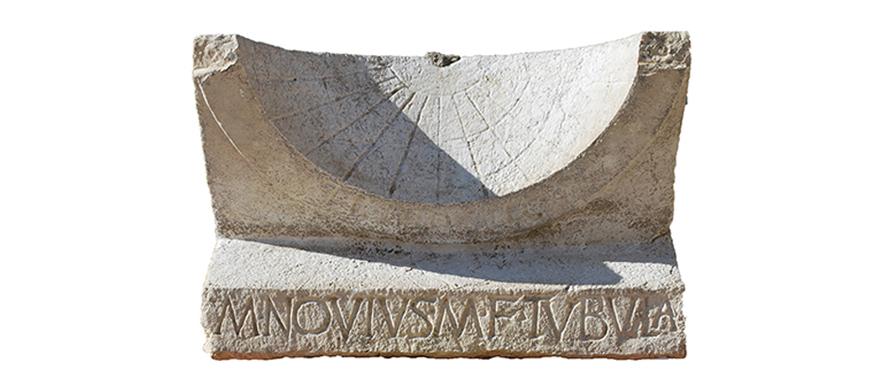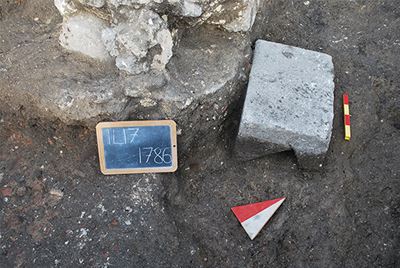
In September 2017 an intact, inscribed stone sundial was recovered during the excavation of the theatre of Interamna Lirenas.
The sundial was found lying face down, in front of one of the theatre’s entrances along a secondary street, probably left behind at a time when the theatre (and the town as a whole) was being scavenged for building materials (Medieval to Post-medieval period). In all likelihood it did not belong to the theatre, but was removed from a prominent spot (on top of a column?) within an open space, quite possibly the nearby forum.

The sundial's findspot.
Carved out from a limestone block (54 x 35 x 25 cm), the sundial features a concave face, engraved with 11 hour lines (demarcating the twelve horae of daylight) intersecting 3 day curves (giving an indication of the season with respect to the time of the winter solstice, equinox and summer solstice). Although the iron gnomon (the needle casting the shadow) is basically lost, part of it is still preserved under the surviving lead fixing.
Although few hundreds sundials are known to have survived (intact or fragmentary) from Antiquity, only a few of them bear any inscription – which is exactly what makes this sundial rather unique.
Two Latin texts are inscribed on it: they are both intact and give precise information about the identity of the person who commissioned the object, an even rarer occurrence. The base prominently features the name of M(arcus) NOVIUS M(arci) F(ilius) TUBULA [Marcus Novius Tubula, son of Marcus], whilst the engraving on the curved rim of the dial surface records that he held the office of TR(ibunus) PL(ebis) [Plebeian Tribune] and paid for the sundial D(e) S(ua) PEC(unia) [with his own money]. The nomen Novius was quite common in Central Italy, being of Oscan origin; on the other hand, the cognomen Tubula (literally ‘small trumpet’) is only attested at Interamna Lirenas.
But even more striking is the specific public office Tubula held in relation to the likely date of the inscription. Various considerations about the name of the individual and the lettering style comfortably place the sundial’s inscription at a time (mid 1st c. BC onwards) by which the inhabitants of Interamna had already been granted full Roman citizenship. That being the case, Marcus Novius Tubula, hailing from Interamna Lirenas, would be a hitherto unknown Plebeian Tribune of Rome and the sundial would have represented his way of celebrating his election in his own hometown (well-advertised on a monument the residents would have often looked at).
Even though the recent archaeological fieldwork has profoundly affected our understanding of Interamna Lirenas, dispelling long-held views about its precocious decline and considerable marginality, this was not a town of remarkable prestige or notable influence: it remained an average, middle-sized settlement, and this is exactly what makes it a potentially very informative case-study about conditions in the majority of Roman cities in Italy at the time.
In this sense, the discovery of the inscribed sundial not only casts new light on the place Interamna Lirenas occupied within a broader network of political relationships across Roman Italy, but it is also a more general indicator of the level of involvement in Rome’s own affairs that individuals hailing from this and other relatively secondary communities could aspire to.
